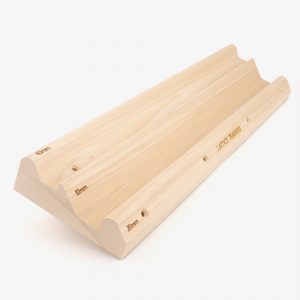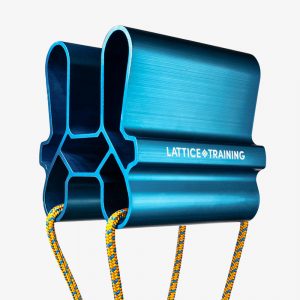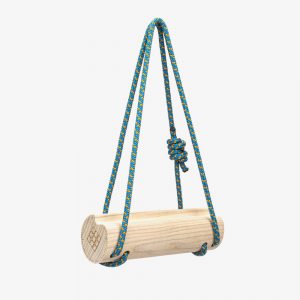How to choose a chalk for rock climbing
A.k.a. Chalk Selection and Why it’s so Hard to Grasp
Choosing the right chalk can be a bit of a minefield. There are so many options on the market these days, with colourful labels and promises of ultimate friction! Pair that with picking a chalk that suits your skin type and this can leave you feeling rather boggled. The aim of this article is to shed some light on the variety of chalk types available and how these can be effectively matched with your skin type.
What skin type are you?
Whether you’re constantly wringing your hands out on your mate’s T-shirt or you’re prone to cracked, splitting skin (or anywhere in between!), it’s important to try to establish your skin type and consider how this changes depending on the climbing environment or the rock type and conditions. This is because these factors could also have an impact on the chalk type that will work best for you. The two most common skin types are dry skin and sweaty skin, although there are many variations and sub-categories and some people have a tendency to flit between the two.
Dry Skin (or Xeroderma)
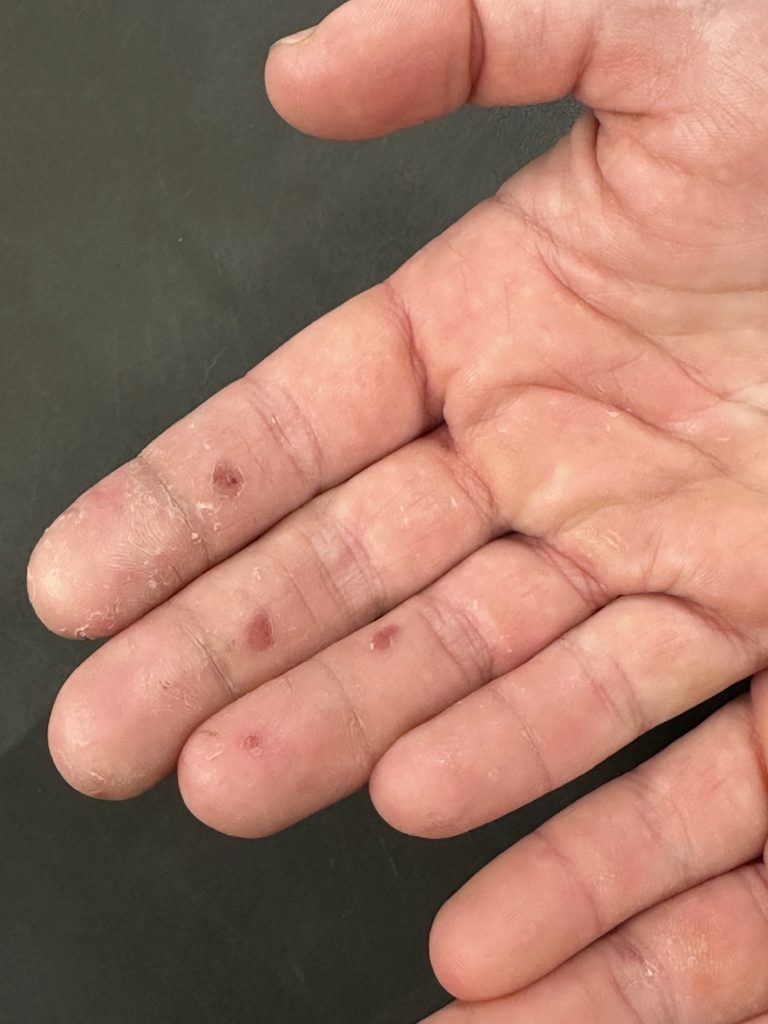

Is your skin itchy, tight, and prone to flaking or splitting? The term ‘dry skin’ refers to skin that doesn’t retain enough moisture to keep it soft and supple. This can often result in the skin cracking or splitting — a climber’s worst nightmare! Not only does this impact grip/friction, but it can be extremely uncomfortable, itchy, and sore. The dryness of your skin can be impacted by many factors, such as allergies, medical conditions/genetics, your age, your working conditions (Is your work outside? Are you required to regularly wash/sanitise your hands?), and the use of products such as moisturisers, soaps, and chalk.
Sweaty Skin (or Hyperhidrosis)
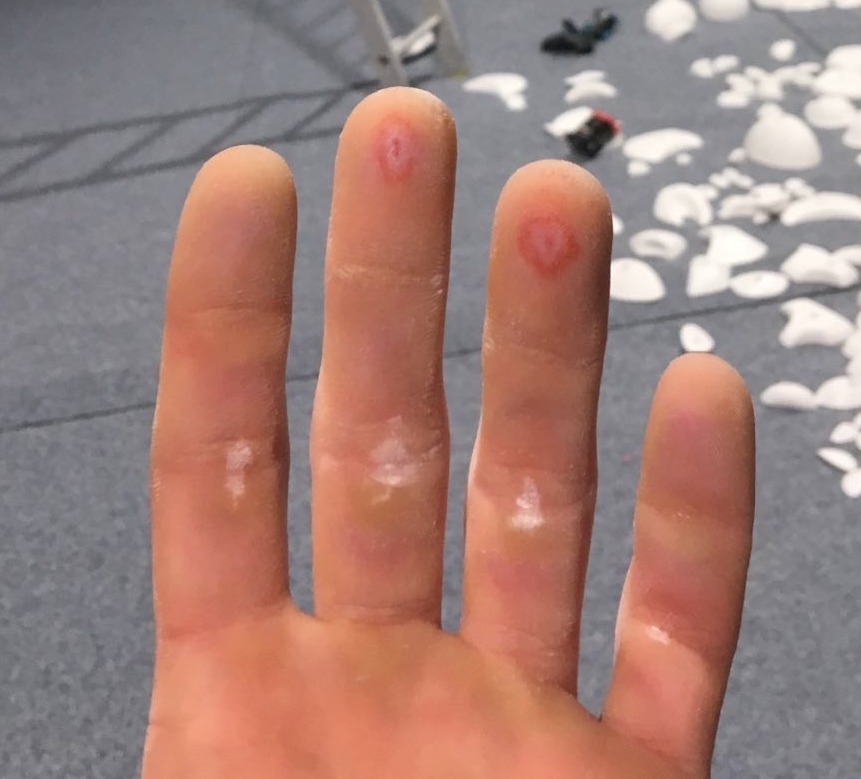
Do you find your hands always seem wet/slippy and skin wears down quickly? It may be more prone to infection? It’s normal for your skin to feel sweaty if you’re feeling anxious or watching a friend have a redpoint attempt on their project, but hyperhidrosis is a condition that causes heavy or excessive sweating. Sweating plays an important role in our body’s thermoregulation, but excessive sweating can be a sign that our sweat glands are on overdrive! Unfortunately, for climbers, the palms are one of the most common areas to be affected. There are many things that can cause sweating including: medical conditions/genetics, medications, stress, certain food/drinks, heat, and exercise, but this can be exacerbated in those that suffer from hyperhidrosis.
Neither Dry nor Sweaty?
Do you experience a combination of symptoms, where sometimes it feels dry and other times sweaty? Your symptoms may vary depending on whether you’re climbing outside with primo dry and windy conditions, or inside in a busy, humid climbing gym. Being aware of how your skin condition changes can be important in choosing the right chalk for the right session.
Tell me more about this wizardry!
There are few companies on the market that specifically design chalk blends tailored towards meeting the varying demands of climbing. Tokyo Powder Industries is a climbing chalk manufacturer based in Tokyo, Japan. They have a chalk blend for every skin type, every discipline, and every climbing condition. Tokyo Powder Industries are trailblazers in the chalk business with their unique formulas and expert research, making them our go-to for high-quality, high-friction chalk that boosts performance. Tokyo Powder also repurposes by-products of the Japanese salt industry, making it both an environmental alternative and a high-quality chalk for climbers.
If you’re prone to Dry Skin, you’ll want to consider the following options:
| PURE | A super pure, super simple chalk. Great for sensitive skin, both sweaty and dry. |
| BLACK | An all-rounder, high-friction chalk for indoors and outdoors. Great for both sweaty and dry skin. |
| BOOST | A sticky primer, specifically for dry skin. |
If you’re more prone to Sweaty Skin, then these options may be more appropriate:
| PURE | A super pure, super simple chalk. Great for sensitive skin, both sweaty and dry skin. |
| BLACK | An all-rounder, high-friction chalk for indoors and outdoors. Great for both sweaty and dry skin. |
| V3 | A drying chalk for damp or humid conditions. |
| REACT | An alcohol-based primer, specifically for sweaty skin. |
Perhaps you don’t have a specific skin condition, but you’re psyched to Tailor Your Chalk Choice to the Climbing Style/Conditions. Here are our top picks for you:
| PURE | Super pure, super simple chalk. Great for both sweaty and dry skin. |
| BLACK | An all-rounder, high-friction chalk for indoors and outdoors. Great for both sweaty and dry skin.dry skin. |
| SUPER B | An ultra high-friction chalk for indoor bouldering. RX + BLACK blend. |
| RX | Chalk specifically designed for plastic holds and indoor climbing. |
| ZERO TT | A long-lasting chalk for route climbing. |
Even if you don’t have a skin condition, choosing the right chalk is always an important choice, whether this is for a trip, to help with marginal gains during the projecting season, or even just for fun, social climbing sessions. Not only is this important for performance and movement economy, but also for the longevity of our skin, our bank balance, and our enjoyment of climbing and movement.
To simplify things further, here is a brief overview of chalk options, based on Climbing Discipline:
And an overview based on Indoor vs Outdoor climbing:
Is your skin condition concerning you?
If you’re displaying any of the symptoms listed above and it’s causing you concern then it’s well-worth getting things checked out by a GP or dermatologist, as there are a number of tests that can be done to assess your skin. Arming yourself with as much knowledge as possible can be empowering and can help relieve any worries or concerns that you might be feeling. Your GP or dermatologist can point you in the right direction, as there’s whole host of products that can provide effective symptomatic relief. A medical professional could also provide peace of mind by ruling out the chances of your symptoms being caused by underlying health conditions such as allergies, diabetes, and heart disease. Seeking medical advice is especially important if your symptoms have a negative impact on the quality of your sleep, they cause you to withdraw or avoid social situations, you’ve explored self-care options without success or you are prone to infection in the affected areas/have open sores as a result of scratching.


